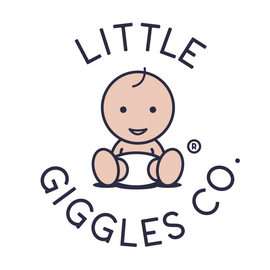
Baby Teeth: Your Essential Guide to Milestones, Care Tips, and Common Concerns from Little Giggles Co.
Welcoming a new baby into the world brings many milestones, including the appearance of those tiny, precious baby teeth. Understanding the journey of baby teeth—from their first appearance to their care and addressing common concerns—is essential for every parent.
Development Milestones of Baby Teeth
Baby teeth, also known as primary or deciduous teeth, typically begin to emerge between 4 to 7 months of age. This process continues until around age 3 when most children have a full set of 20 primary teeth. Each child's timeline may vary slightly, but the general order of tooth eruption is fairly consistent:
- Lower central incisors (bottom front teeth) usually appear first around 6-10 months.
- Upper central incisors (top front teeth) follow shortly after, around 8-12 months.
- Lateral incisors, first molars, canines, and second molars complete the set by age 3.
Understanding when these teeth are expected to appear can help parents monitor their child’s dental development and identify any potential issues early on.
Essential Care Tips for Baby Teeth
Proper care for baby teeth is crucial for their development and long-term oral health. Here are some essential tips:
-
1. Start Oral Hygiene Early
Tip: Begin cleaning your baby’s gums with a soft, damp cloth even before teeth emerge. Once the first tooth appears, switch to a soft-bristled baby toothbrush and use a tiny smear (about the size of a grain of rice) of fluoride toothpaste.
Why It’s Important: Early oral hygiene habits prevent cavities and promote healthy teeth and gums. Establishing a routine from the start helps your baby get used to dental care.
-
2. Maintain a Balanced Diet
Tip: Provide a diet rich in fruits, vegetables, and dairy products. Limit sugary snacks and drinks, as they can lead to tooth decay.
Why It’s Important: A balanced diet supports healthy tooth development and reduces the risk of cavities. Healthy snacks help maintain strong teeth and gums.
-
3. Use Safe Teething Toys
Tip: Offer teething toys like the Little Teethers Sensory Rattle Ring Teether Set to soothe sore gums. Choose products that are BPA-free and easy to clean.
Why It’s Important: Safe teething toys help relieve discomfort and stimulate your baby’s senses. Look for teething toys with different textures to massage gums.
-
4. Avoid Putting Your Baby to Bed with a Bottle
Tip: Avoid giving your baby a bottle filled with milk or juice at bedtime. Opt for water instead or establish a bedtime routine without the bottle
Why It’s Important: Going to sleep with milk or juice can lead to tooth decay, also known as “baby bottle tooth decay.” Water is a safer choice for bedtime.
-
5. Schedule Regular Dental Checkups
Tip: Schedule your baby’s first dental visit around their first birthday or within six months of their first tooth appearing. Regular checkups ensure early detection of potential issues.
Why It’s Important: Regular dental visits help monitor your child’s dental development and prevent future problems. Early visits can also make your child more comfortable with dental care.
Common Concerns About Baby Teeth
Despite its natural progression, some parents may encounter concerns during their child’s teething phase:
-
Teething Pain: Babies may experience discomfort as teeth push through the gums. Offer chilled teething rings or clean, cold washcloths to alleviate soreness.
-
Delayed Tooth Eruption: While the timing of tooth eruption varies, a significant delay might indicate underlying issues. Consult your pediatric dentist if you have concerns about delayed tooth development.
- Caring for Early Cavities: Tooth decay can occur as soon as teeth appear. Regular dental check-ups and proper oral hygiene are essential to prevent cavities and maintain healthy gums.
Importance of Early Dental Care
Early dental care sets the foundation for a lifetime of healthy teeth and gums. Schedule your child's first dental visit around their first birthday or within six months after the first tooth emerges. This visit allows the dentist to monitor dental development, provide guidance on oral hygiene practices, and address any concerns you may have.
Conclusion
Navigating the world of baby teeth involves understanding their milestones, implementing effective care strategies, and addressing common concerns promptly. By following these tips and incorporating products like the Little Teethers Sensory Rattle Ring Teether Set, you can ensure your baby’s dental journey is as comfortable and healthy as possible.
Discover the Little Teethers Sensory Rattle Ring Teether Set
-
Soothes Baby Teeth Discomfort:
- Gentle relief for sore gums during teething.
- Soft silicone material ensures a safe chewing experience.
-
Stimulates Sensory Development:
- Vibrant colors and charming design captivate your baby’s attention.
- Different textures for a satisfying and stimulating chew.
-
Easy to Hold:
- Perfect for tiny hands to grasp and explore.
- Easy-to-hold ring design promotes motor skill development.
-
Built-in Rattle:
- Adds an extra layer of sensory fun.
- Encourages your baby to shake, listen, and learn.
-
Safe and Non-Toxic:
- Free from harmful chemicals like BPA.
- Designed with your baby’s safety in mind.
-
Essential for Baby Teeth Care:
- Must-have for parents to ease the teething phase.
- Makes the baby teeth journey joyful and less stressful.
Explore our range of teething solutions and discover how they can support your baby’s developmental milestones. Remember, each tooth that emerges is a sign of your baby's growth and a milestone worth celebrating!
Take Care!
Little Giggles Co.
Sources
NHS: Taking care of childrens teeth: https://www.nhs.uk/live-well/healthy-teeth-and-gums/taking-care-of-childrens-teeth/
NHS: How to take care of your baby or toddler's teeth: https://www.nhs.uk/start-for-life/how-to-take-care-of-your-baby-or-toddlers-teeth/
American Dental Association. (n.d.). Baby Teeth: When They Come In & When They Fall Out. Retrieved from https://www.mouthhealthy.org/en/az-topics/b/baby-teeth
Mayo Clinic. (2023). Teething: Tips for soothing sore gums. Retrieved from https://www.mayoclinic.org/healthy-lifestyle/infant-and-toddler-health/in-depth/teething/art-20046378



